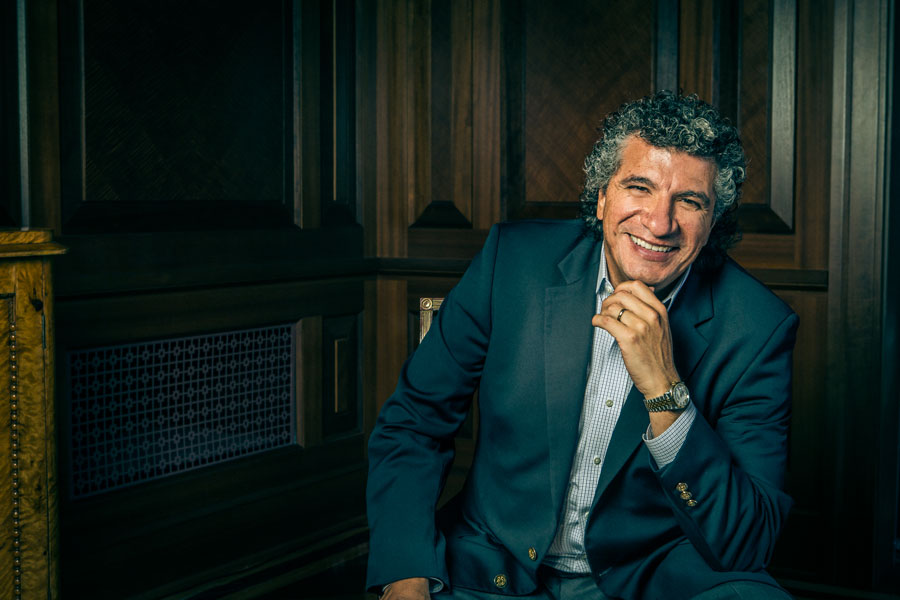Giancarlo Guerrero, a native of Costa Rica, is a five-time Grammy award winning Music Director of the Nashville Symphony Orchestra, a post he has held since 2009 and recently committed to through the 2024-25 season. Guerrero previously held posts as the Principal Guest Conductor of The Cleveland Orchestra Miami Residency from 2011 to 2016, Music Director of the Eugene Symphony between 2002 and 2009, and Associate Conductor of the Minnesota Orchestra from 1999 to 2004. The Narodowe Forum Muzyki is very pleased with the appointment of Giancarlo Guerrero to the position of Artistic Director of the Wroclaw Philharmonic! Guerrero will conduct four weeks during the 2017 season in Wrocław, and beginning with the 2018 season, he will spend eight weeks per season with the orchestra in addition to touring and recording activities.
Boris Giltburg was born in Moscow in 1984, he then moved to Tel Aviv and grew up in Israel. He began studying piano with his mother, and then with Arie Vardi. In 2011, Giltburg won the second and audience prizes at the Rubinstein Competition. In 2012, he released an album of Prokofiev War Sonatas on Orchid Classics, earning him a nomination for the Critics’ Award at the Classical Brits. His Romantic Sonatas album of Rachmaninov, Liszt, and Grieg followed in 2013. His first solo releases on Naxos of Schumann and Beethoven attained ardent reviews, and his Rachmaninov album was named Gramophone’s Disc of the Month. Also, in 2013 he won first prize at the Queen Elisabeth Competition, which raised his status as a soloist.
Sergei Rachmaninoff wrote the Third Piano Concerto for his first American tour in 1909. The piece was composed during the summer of 1909 at his family estate Ivanovka. The premiere took place with two New York performances under Gustav Mahler. Rachmaninoff reportedly thought very highly of the maestro and the Philharmonic saying, “Mahler was the only conductor whom I considered worthy to be classed with Nikisch. He touched my composer's heart straight away by devoting himself to my Concerto until the accompaniment, which is rather complicated, had been practiced to the point of perfection, although he had already gone through a long rehearsal. According to Mahler, every detail of the score was important, an attitude which is unfortunately rare among conductors.” Rachmaninoff composed four piano concertos throughout his career and was the soloist at the premiere of each. The Third Piano Concerto has earned a reputation as one of the most technically demanding works in the repertoire, and pianists have often been quoted to regard it as a challenge they feel compelled to surmount. Although, Rachmaninoff, having hands that spanned the interval of a 13th, maintained that his Third Concerto was “more comfortable” to play than his Second.
Gustav Mahler worked on his First Symphony in February and March of 1888, by integrating music that he had written earlier. The first performance was given on November 20, 1889, in Budapest, with the composer conducting. The First Symphony is indebted to such sources as Mahler’s Wayfarer songs, incidental music written for Der Trompeter von Säkkingen, yodelling, military fanfares, café music, the opening of Beethoven's Ninth Symphony, a love song he wrote in 1880, reveille, and the German Ländler. This was Mahler’s first large and purely orchestral work and it took him some time to bring all his material together to create a lucid whole from the individual parts. When Mahler finally published the piece fifteen years later, he had discovered a new kind of symphony that linked the creativity and storytelling of the symphonic poem with the architectural organisation of the symphony as it was known. It is evident, at the time, that Mahler was experimenting with ways of creating overwhelming volumes of sound. He even suggested in the score that the expanded horn section should stand, bells raised, in order to surmount the rest of the orchestra during the finale.
When the piece was introduced in Budapest it was billed as a "Symphonic Poem in two parts" with three movements in part 1 and two in part 2. At its first performance the pastoral and idyllic Part 1 was in much better received than Part 2, with its ‘new romantic’ excesses. Mahler wrote to the critic Max Marschalk in March 1896, “At the time my friends persuaded me to provide a kind of program for the D major symphony in order to make it easier to understand. Therefore, I had thought up this title and explanatory material after the actual composition. I left them out… not only because I think they are quite inadequate and do not even characterise the music accurately, but also because I have learned through past experiences how the public has been misled by them.”
The first movement begins "like a sound of nature," with its overtly marked cuckoo calls, fanfares tuned to A-natural and scattered over seven octaves, and an effect is created by three offstage trumpets. Next comes a scherzo set to foot-stomping dances and yodelling, similar to material Mahler had used for his first songs in 1880. The third movement, Mahler says, is a satiric cartoon of "The Hunter's Funeral" a vision of a hunter's coffin drawn by animals, turned into musical life. The finale begins with a "flash of lightning from a dark cloud" Mahler claimed, "It is simply the cry of a wounded heart." Later the work returns to the pastoral themes of the first movement, but rather than setting off on a journey, headed straight for triumph.
Alixandra Porembski, English Language Annotator

